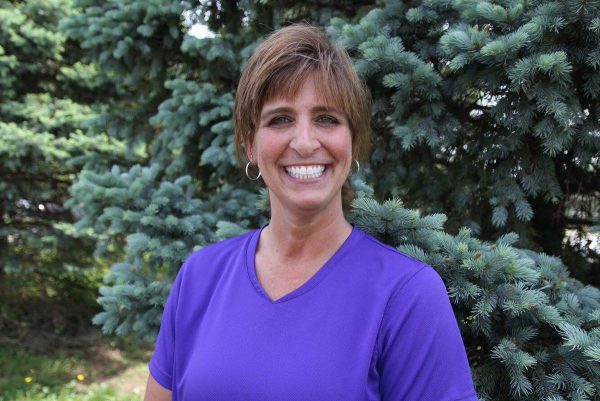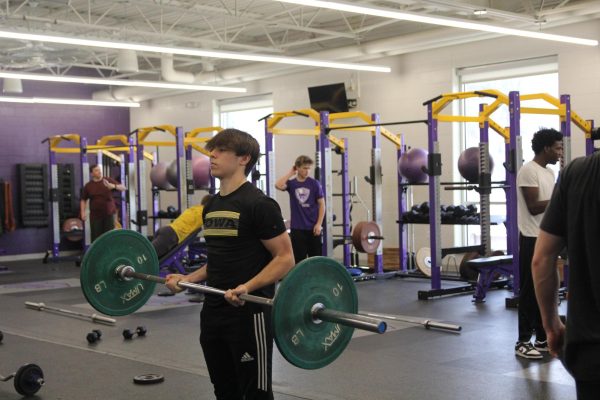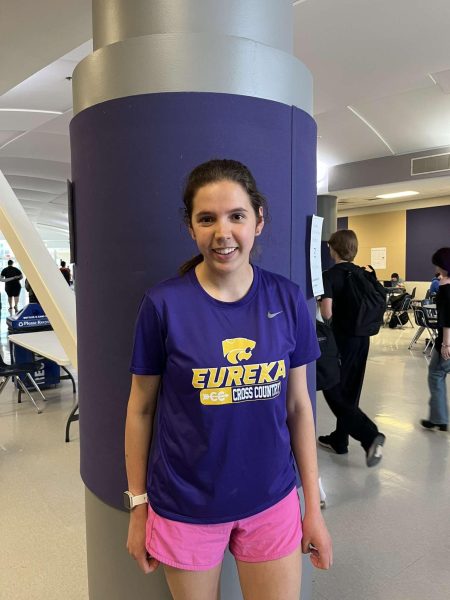Running on empty
Second Chance food line gives students another opportunity to fuel up for the day
The reality of an 8:16 a.m. school start translates into a rushed morning at best.
7:15 a.m.: Get up and out of bed
7:15-7:30 a.m.: Shower, brush teeth and get dressed
7:30-7:45 a.m.: Eat something hopefully: maybe a breakfast sandwich or a granola bar
7:45 a.m.: Leave to pick up carpool
7:45-8:06 a.m.: Pick up riders and park at school
8:16 a.m.: school starts
“I don’t have time. I usually wake up late and walk out the door within 10 minutes,” Emma Agoncillo (9) said.
Second Chance is the new initiative by EHS to give students the opportunity to get something to eat if they missed breakfast. Between the second and third hour passing period, students have six minutes to grab a bite and head to their next class. Second chance is located directly across the Deli lines (lines four and five) against the wall in the cafeteria.
This new implementation lies behind the human need for food.
UCLA’s Brain Research Institute and Brain Injury Research Center reports, “Omega-3 fatty acids — found in salmon, walnuts and kiwi fruit — provide many benefits, including improving learning and memory and helping to fight against such mental disorders as depression and mood disorders, schizophrenia, and dementia.”
“Food is going to have a big role in the way the brain works that day,” Melissa Menchella, Health Education, said, “Without your food you’re going to be thinking about food all day if you don’t get it. You won’t be able to focus if you’re focusing on hunger throughout the day.”
What students do not realize is the extreme importance of breakfast before school, as it affects the way they learn and the ability to remember new information.
“You have to refuel your brain so if you don’t eat something for breakfast, whether it be when you first get up or later, you need that fuel to provide your brain the power it needs and energy it needs to process and be successful.” Carmen Fischer, director of Child Nutrition Services, said.
Besides being a sponge for new information, the brain also controls a person’s ability to focus.
“It definitely helps you focus more and pay attention. I know when I’m hungry I like to zone off and I get tired,” Amber Gunhus (12) said. “I feel weak. Food definitely gives me more energy.”
Breakfast not only gives the brain energy, but it is the fuel for the day up until lunch. Without that fuel students’ brains’ cannot fully function.
“The brain is a massive energy suck–it uses glucose way out of proportion to the rest of the body,” Forbes reports. “In fact, it requires about 20% of the body’s energy resources, even though its volume is just a tiny percentage.”
Everyone needs breakfast. Students are not the only offenders.
“If I don’t eat breakfast I feel like I don’t have a whole lot of energy,” John Wunderlich, Guidance Counselor, said. “I always drink a diet soda in the morning. If I don’t eat breakfast first, I get the jitters and can’t really concentrate as well. I try to make it a priority, but it doesn’t always happen.”
In the middle of the morning rush, the casualty is breakfast–the fuel brains require.
Time management prohibits students from learning to their fullest potential. Sheila Jaycox, secondary manager of Child Nutrition Services, wants Second Chance to change that.
“There are some students that aren’t hungry when they first get up in the morning, some who may be running late and we’ve already closed,” Mrs. Jaycox said. “This gives them the opportunity to still get breakfast and help them study. It makes minds better, and then they aren’t thinking about being hungry.”
Healthy options at the second chance line include a nutrient rich entree (cereal, nutrition bread, etc.), a drink and the choice of a fruit. Students can rest assured they are getting the nutrients they need to strive throughout the rest of the day.
“Eating highly processed carbs, which break down very quickly, leads to the famous spike-and-crash of blood sugar (which your brain certainly feels). But eating whole, unprocessed foods leads to a slow, steady rise, and a more constant source of energy–and it makes the brain much happier,” according to Forbes.
Not only does the type of food affect the brain’s energy but also the feelings and attentiveness of the brain.
“The type of food you eat can definitely affect your body. Eating healthier stuff in the morning can affect how I feel and if I want to learn or not,” Abdulla Ahmed (11) said. “I feel more energized and focused because of the nutrition I eat.”
A lack of nutrients leads to lower performance; the brain can’t function without food.
NPR reported, “In a recent study of 4,000 elementary school students, researchers measured the effects of eating breakfast by administering a battery of attention tests. To measure short-term memory, researchers read a series of digits out loud — 5, 4, 2 and so on — and asked the children to repeat them. The children were scored on how many digits they could remember correctly. To test verbal fluency, the kids were asked to name all the animals they could think of in 60 seconds. Across the board, the breakfast eaters performed better than those children who had skipped breakfast.”
When students are expected to learn new information throughout the day, they must have a source of energy to keep going and learn the new material being taught to them.
“If a student does miss breakfast how can they concentrate, how can they think, how can they learn?” Todd Trotta, Language Arts, said.
Second Chance is an opportunity for students to take ownership of their day. For just a dollar, brains are refueled with nutrient-dense food to lead to a successful day.
Your donation will support the student journalists of Eureka High School - MO. Your contribution will allow us to purchase equipment and cover our annual website hosting costs.

This is Margherita's fifth semester on staff where he serves as an opinions writer for the EHS_hub. Marghertia enjoys discovering new music, traveling...

















